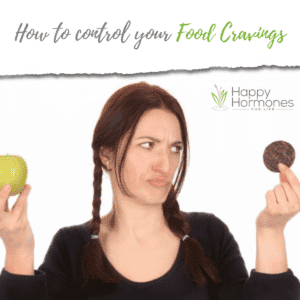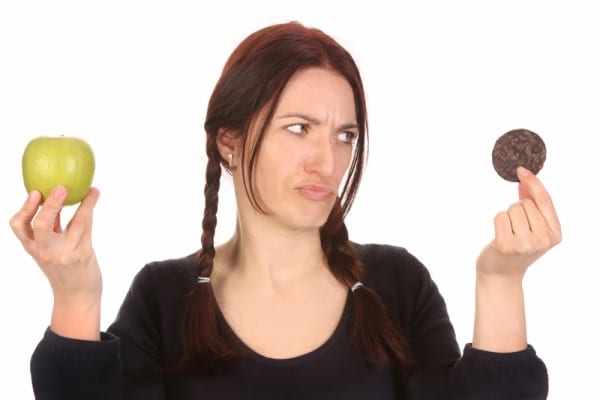Food cravings…Are they real? Or are we just all weak when it comes to choosing healthy food options?
I’m not talking weird pregnancy cravings here (they have their own story), I’m talking about those daily cravings that you can’t ignore. That morning Starbucks, the afternoon cake/chocolate run in the office, the late night crisp munchies. The ones that rule you, day in day out, and ultimately may be ruining your health too.
Why do we have food cravings?
We (especially women) often beat ourselves up about our lack of willpower when it comes to our food choices. But food cravings are often all too real.
There are strong physiological urges at play here. Hormonal and biochemical messages are going to your brain to get you to eat certain foods. And it’s a survival mechanism from cave man times, which means the food (or drink) might not be the healthiest option, but it will give you a quick energy boost so you can run away from the sabre toothed tiger about to attack you. Or it will be a quick and convenient source of a certain nutrient, but may not be the most healthy version of it.
And we can’t ignore those monthly PMS related food cravings, which magnify everything!
Common Cravings
COFFEE – we are a nation of coffee addicts. Even more so now with a coffee shop every 5 yards in most streets. There are some definite health benefits to coffee – it’s full of antioxidants and for some people it’s fine. But if you’re using it as a crutch to get you through the day, you might want to address what could be causing the craving;
- Adrenal fatigue – when we have been over-stressed for some time, our adrenals can struggle to produce the cortisol we need for energy and dealing with our daily stresses. Coffee raises cortisol to keep us going.
- Underactive thyroid – insufficient thyroid hormones can cause fatigue, sluggishness, brain fog, lethargy. So coffee can be the temporary fix to raise our metabolism.
Coffee may be a temporary fix for your low energy, but if you don't address the underlying hormonal issues, you are risking more serious complications as you get older. If you suspect your coffee habit is more of a survival tool, or you have trouble sleeping, you may want to try to wean yourself off.
The alternative? Decaff is often not the answer as this can raise cortisol levels as well (and is often processed using harsh chemicals). Try switching to herbal coffee, green tea or other herbal teas. Watch out for caffeine withdrawal symptoms (headaches, brain fog, fatigue) which should only last a few days.

SUGAR – sugar is lurking in everything these days, even so-called ‘healthy' foods – check out this shocking video on hidden sugars! So why do we all have such a sweet tooth?
- Sugar is addictive – a recent study on rats found it was as addictive as cocaine. One theory is that sugar can stimulate the same area of the brain associated with addiction, increasing your feel good hormones like serotonin and dopamine. Sugar was a very rare treat when we were cave people – natural sugars found in fruit, the odd handful of berries or some honey. Our food now is loaded with added sugar – the food companies spend a fortune on making their foods as addictive as possible! So if you are used to sugary snacks, you will crave more. They are giving you a high, which is super hard to resist.
- The blood sugar roller coaster – when you eat sugar (or carbs), your blood sugar spikes, you produce insulin to remove the sugar, your sugar levels plummet giving you sugar cravings all over again! And we know that raised insulin is a risk factor for diabetes, inflammation and other chronic conditions.
- Sugar is feeding your bugs – that’s your bad bacteria, yeast, fungi or parasites that live in our digestive system. They love to feed on sugar and if you have an overgrowth of any of them, they can be sending signals for you to eat more sugar.
The alternative? Avoid artificial sweeteners and choose healthy sugar alternatives such as xylitol, stevia, erythritol and raw honey. Eating more good quality protein and healthy fats will not only fill you up, but help to stabilize your blood sugar so that you don’t get the crazy low dips that make you crave sugar. So fill up on nuts, seeds, avocado, full fat organic dairy, vegetables, pulses, beans, quinoa, organic meat, wild caught fish, coconut oil/milk, nut butters. Try taking a good quality probiotic to increase your good bacteria. Consider supplementing with chromium, which has been shown to help with blood sugar balance.
CHOCOLATE – by far the most common ‘must have’ I see in clinic is chocolate. Not the good kind either (which I’m all in favour of!). Why are so we desperate for chocolate?
- The sugar and fat combo – by far the most addictive and satisfying combination is fat and sugar together (think donuts, chocolate cake, biscuits).
- Magnesium deficiency – magnesium is a stress reliever, muscle relaxant and essential for energy production (and 300 other functions I haven't got room to list!). Deficiency is common because we don’t eat enough magnesium rich foods.
The alternative? Swap milk chocolate for dark (over 70%) – which is not only less sugary but also is rich in antioxidants so is actually good for you! Read more about the health benefits of chocolate here. Eat more nuts, seeds, dark green leafy veg to get your magnesium fix. And a bath in Epsom Salts will also help increase your magnesium (and reduce your stress levels).
WHITE CARBS – sometimes you just HAVE to have that pile of chips, a big bowl of pasta, a packet of crisps, or a big chunk of white bread. These foods are pretty much the same as sugar unfortunately. They will break down into glucose once you have chewed them (you can sometimes taste the sugars if you chew well enough!). Why do we crave carbs?
- Blood sugar roller coaster – that sandwich at lunchtime has worn off and by mid afternoon your blood sugar is low and you are ravenous!
- Nutrient deficiency – often this is due to not eating very well during the day, your body is craving nutrients and so thinks it is in a period of famine (even if you have eaten a lot of ‘food’ during the day). This raises your cortisol levels sending your brain signals to eat anything at all, especially carbs as this is the quickest source of energy. This also applies to a low calorie diet.
- Wheat intolerance – it’s quite common for the body to crave foods we are intolerant to – wheat and gluten are big ones. Common symptoms include bloating, indigestion, diarrhoea, constipation, cramps, headaches, depression, joint pain, skin conditions, asthma.
- Serotonin deficiency – serotonin is our feel good hormone and low levels can cause depression. Low levels can also stimulate cravings for carbohydrates. Exercise and Vitamin D help to increase levels.
The alternative? Balance your blood sugar by eating a low GL nutrient dense diet, plenty of protein and healthy fats at each meal, with slow releasing carbs like whole grains, vegetables, quinoa, brown rice, sweet potatoes, lentils, beans and pulses. Eat proper meals at breakfast and lunch so you don’t crave a big carby meal at night. Get outside, exercise and take a vitamin D supplement during the winter months.
DIET COKE/SODAS – I was a diet coke addict for many years before I managed to wean myself off. I thought I was making the healthier choice and not having the ‘fat coke' version!
But diet drinks are not the answer;
- The artificial sweeteners in diet drinks are linked to many chronic health conditions – just check out this article on aspartame
- Diet drinks have been linked with weight GAIN
- There’s salt in your diet drink – making you crave more to hydrate you!
- The can is lined with BPA – a known hormone disrupter
The alternative? Coconut water is a good alternative, although it does contain some natural sugars so don’t drink too much. Good old water is what your body needs. Try to make sure it's filtered though, and not from plastic bottles containing BPA.
Food cravings are complicated. There are emotional factors involved too which I haven’t covered. And everyone is unique. What drives your cravings may be totally different to mine.
But essentially if you eat the right foods for you most of the time (follow the 80/20 rule), your body should have what it needs and you won’t have too many cravings – unless it’s for a nice bowl of kale…!
Click here for your FREE Hormone Balancing Guide. Or contact us for a one to one Discovery Call.
Huxley R, Lee CM, Barzi F, et al. Coffee, decaffeinated coffee, and tea consumption in relation to incident type 2 diabetes mellitus: a systematic review with meta-analysis. Arch Intern Med. 2009;169:2053-2063. Abstract Fisher & Hollenberg (2005). Flavanols for cardiovascular health: The science behind the sweetness. Journal of Hypertension, 23:1453-1459 Schulze MB et al., (2004) Sugar-sweetened beverages, weight gain, and incidence of type 2 diabetes in young and middle-aged women. JAMA. Rada et al., (2005) Daily bingeing on sugar repeatedly releases dopamine in the accumbens shell. Neuroscience. Blum, Kenneth (2006). Reward deficiency syndrome in obesity: a preliminary cross-sectional trial with a genotrim variant. Advances in Therapy. – See more at: http://robbwolf.com/2012/10/05/serotonin-deficiency-food-cravings/#sthash.AeF7Y5dK.dpuf Fowler et al (2008) Fueling the obesity epidemic? Artificially sweetened beverage use and long-term weight gain. Obesity (Silver Spring). 2008 Aug;16(8):1894-900. WHO 2012 State of the Science of Endocrine Disrupting Chemicals. http://apps.who.int/iris/bitstream/10665/78102/1/WHO_HSE_PHE_IHE_2013.1_eng.pdf
[accordion-item title=”Click to View Sources”]


Comments 1
Dopamine and serotonin are two other hormones that greatly influence your food cravings. Dopamine and serotonin regulate your mood and happiness levels, and when these hormones are out of balance, you may never feel happy and satisfied with your meals, or they may trigger you to emotionally crave foods .